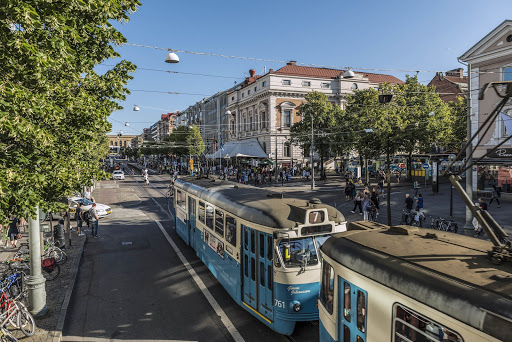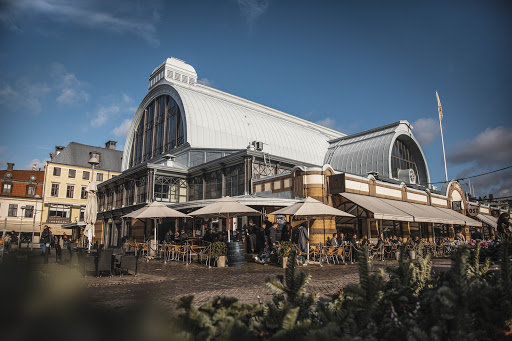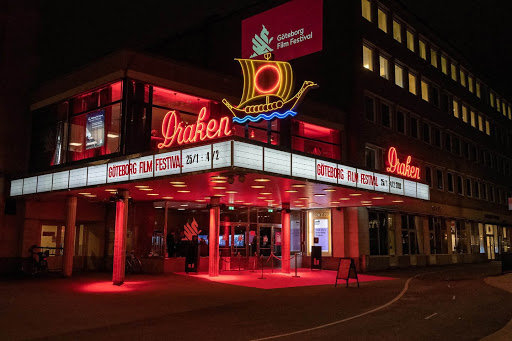A scene from Swedish provocateur Anna Odell’s film, Undersökningen (The Examination). (Courtesy of Göteborg Film Festival)
I am naked from the waist down, my weight balanced at the top of my tailbone and my feet up in the air with legs splayed out by plastic stirrups.
I am exposed, vulnerable and only vaguely preoccupied with the paranoia that if the screen in front of me possessed spyware, it would be able to conduct a reasonable mapping out of my sphincter for Google.
In the room, the walls have biological diagrams of male and female reproductive systems and are painted in what appears to be medicine’s universally accepted colour of choice: somewhere between beige-white and the transparent greenish pee that comes from being attached to a drip for days uninterrupted.
The colour is anodyne and sterile. Its innocuous neutrality masks the centuries-old history of violence inflicted on black, brown, female and queer bodies in the name of treatment, experimentation and the advancement of medicine, science and psychotherapy.
I am sat in a gynaecologist’s examination chair. But I am not in a doctor’s examination room. The waiting area outside — with “nurses” scurrying around in scrubs, medical files and gossip magazines — is part of an installation, The Gynaecological Cinema Chair, at the 42nd Göteborg Film Festival held over January and February 2020. The screen flickers to life and Swedish provocateur Anna Odell’s film, Undersökningen (The Examination), begins.
Odell interviewed powerful Swedish men, including a former justice minister and a former police chief, discussing themes including equality, power and empathy; men who were then asked to undergo a gynaecologist’s examination. Most refuse, some oblige to sit in the chair with their clothes on while the procedure is explained to them by a doctor. Others suggest alternatives to this exercise meant to explore vulnerability and submission.
The journalist and author, Jan Guillou, a macho styled in the mould of Ernest Hemingway, responds to Odell’s question about his definition of strength by saying: “It’s about holding on to your convictions … If you go to Africa and you are in the bush you learn that you must hold your ground … hold your ground and shoot straight.”
 Jan Guillou declines an invitation for probing in Anna Odell’s Undersökningen (The Examination). (Courtesy of Göteborg Film Festival)
Jan Guillou declines an invitation for probing in Anna Odell’s Undersökningen (The Examination). (Courtesy of Göteborg Film Festival)
The African “wilds” are apparently less threatening to Guillou than a Swedish clinician’s examination: he later declines the invitation for a probing. Instead, he suggests prostrating himself before Odell, who places a booted foot on his head to crown his apparent capitulation.
Some interviewees intellectualise their refusal while others play to the vanities and giddy sense of self that centuries of structural patriarchy has instilled in men. Many responses confirm how difficult it is for the powerful, in any space, to concede their power and privilege to those they oppress consciously or subconsciously, tacitly or explicitly. A few agree to strip, sit down and shut up.
This act, the discomfiting nature of the interviews, and the manner of filming and editing, provokes a range of responses. Among them reflections on vulnerabilities and submission; a rumination on the essence of trust; questions about art “manufacturing empathy” and anxieties about “avant-garde dead-ends”.
There is a sense of absurdity in viewing the examination in so exposed a position, one which has otherwise only intruded into the reality of women. This absurdity illuminates a loss of control of one’s destiny. A creative and philosophical connection that Albert Camus draws in his novel, La Peste (The Plague); but also an existential sense of the world, of disempowerment, that men have inflicted upon women for centuries.
I ponder all this as I walk along Göteborg’s polite, neat streets, which, in late-winter, are grey and wet. Despite the Saturday lunch-time movement of young families with baby strollers and Swedes glowing robustly with health, the city’s gentrified Haga district with its hip coffee shops and restaurants, cobblestones and cute late 19th-century houses that stand out like marzipan buildings on a painstakingly-iced cake is, but for the raindrops, almost silent. This is as far away as I can get from the noisy, jagged-edge chaos of a Saturday morning during the heat of summer in inner-city Johannesburg, where I live.
It is early February and the coronavirus pandemic that will, over the course of 2020, confine most of the world’s population to their homes and deprive them of the power to decide so much of their futures, is still a carefree afterthought: the source of a humour that has yet to hang on the gallows, darkening to black.
The virus is starting to spread around the world, according to news reports. A Chinese colleague laughs off my concerns. She has just arrived from Shanghai, where she lives, and Wuhan, the epicentre of the outbreak in China is too far away from her home city for her to stay awake at night for any reason other than jet-lag, she says to reassure.
“It will be contained,” she adds with a certainty that is unnerving, especially since the first case of infection in Sweden has just been registered. The positive patient has admitted themself to hospital and appears to be doing well.
Two Italian colleagues joke about how the responsible, model social democrat Swedish citizen is so different from the “crazy” Italians, where state, social culture and an anarchic love of life would collude to assist in the virus spreading, rather than stopping it. I laugh and offer a similarly gross generalisation of South Africans; because my people are equally noisy and rule-averse, keen on protecting whatever of their privilege, given to excess and a love for the moment that often only deepens regret afterwards.
We speak glibly, without foreboding or any comprehension of the tens of thousands of dead bodies that will pile up in our countries over the course of the year ahead.
We do not imagine that death will touch almost every family. Or that governments will let down their people so badly.I carry that laughter canned inside for all of 2020.
Months later, in rereading The Plague, Dr Bernard Rieux is at the Algerian coastal town of Oran’s train station, seeing his sick wife off to a nearby spa town for treatment. Oran’s citizens have only just begun to notice the antaean mounds of dead rats on their streets. This will precede an, as yet, unfathomable human plague.
On the station platform, Rieux bumps into Monsieur Othon, Oran’s police magistrate:
“The engine whistled.
“‘These rats, now…’ the magistrate began.
“Rieux made a brief movement in the direction of the train, then turned back towards the exit.
“‘The rats?’ he said. ‘Its nothing …’
“The only impression of that moment which, afterwards, he would recall was the passing of a railwayman with a box full of dead rats under his arm.”
 A tram passes by on Avenyn, Göteborg’s main boulevard. (Steampipe Production Studio AB/Göteborg & Co)
A tram passes by on Avenyn, Göteborg’s main boulevard. (Steampipe Production Studio AB/Göteborg & Co)
About 95% of the public transport in the Göteborg region runs on renewable energy and as I trudge alone towards the city’s central business district, punctual, silent trams pass me by. That there are no minibus taxis to dodge or swear at is suffocating.
At Kungstorget (The King’s Square), one of the city’s main squares, architect Hans Hedlund’s Stora Saluhallen (Market Hall) rises above the nearby waterways, boutique shops, a cinema complex and outdoor cafes empty against the weather. The hall’s faded aquamarine roof is seemingly distended by all the meat, fish, organic vegetables and fruit, cheeses, artisanal breads and jams inside.
Formalised in 1889 from an outdoor gathering of farmers into one of the first public buildings in Sweden to be built using brick, its insides are, oddly, missing the collision of smells one usually finds in markets. The Market Hall is certainly without the pungent aromas that assaults on Kerk Street — one of the cheapest, and most popular, “formalised” informal street markets in Johannesburg’s inner city.
I do not, as yet, know enough about the coronavirus to worry about a potential loss of smell and taste — especially when the fried herring with mashed potatoes and lingonberry jam at a crammed no-frills stall selling traditional Swedish food confirms my taste buds by proving so delicious. I walk up Avenyn, the main boulevard that connects Göteborg’s downtown with the Götaplatsen, the square where the Hasselblad Centre for Photographic Art, Konstmuseet (Göteborg Museum of Art) and other cultural institutions are found.
 The Saluhallen’s faded aquamarine roof is seemingly distended by all the meat, fish, organic vegetables and fruit, cheeses, artisanal breads and jams inside. (Photos: Peter Kvarnström/Göteborg & Co)
The Saluhallen’s faded aquamarine roof is seemingly distended by all the meat, fish, organic vegetables and fruit, cheeses, artisanal breads and jams inside. (Photos: Peter Kvarnström/Göteborg & Co)
I pass the Stora Teatren that sits alone, apart from the rest of the buildings on this strip. A guest venue for performing arts built in the 1850s in a neo-Renaissance style, the theatre appears out of place on the Avenyn where nods to Nordic functionalism, like the Konserthuset (Göteborg Concert Hall) and the City Library, are commonplace.
The words of Martha Batalha, the Brazilian author of The Invisible Life of Euridice Gusmao, feeds a comforting sense of solitude, of unfamiliarity and being out of place. Batalha was living in New York when she started writing her novel. “It’s very interesting when you are not living in your country anymore because I think that I was feeling like I was a drop of oil in the water,” she said. “You become very aware of your work and the things you know about yourself and how different your family and your life and your past is to everything around you … I could see better my country and my culture and the stories I could tell.”
Batalha was speaking during a question-and-answer session following the screening of the film adaptation of her book at the magnificent Draken (Dragon) theatre, which, with its curved sidewalls and concave ceilings covered in Honduras mahogany, is reminiscent of the Viking longboats of another time — and kind — of travel.
Directed by Karim Aïnouz, The Invisible Life, which won the Un Certain Regard prize at Cannes, is, on screen, a gorgeous, heartrending melodrama. The film follows the lives, from the 1950s onwards, of two sisters, Euridice and Guida, who come from a conservative middle-class family in Rio de Janeiro.
Despite being closer than laugh-marks on skin, the sisters spend almost their entire adult lives in the same city, yet completely unaware of the other’s existence there — because of the deceptions and decisions of the men close to them: a rigidly conservative father, a domineering and mediocre husband and an errant lover, especially.
“The book started with a very simple question: what would happen to an extremely intelligent woman if she was born in a place and in a time when she couldn’t fulfil herself?” Batalha continued. A question that still seems to echo through the ages, often falling on male ears deaf to empathy like autumn leaves on barren ground.
Göteborg’s Konsthall, a centre for contemporary art, sits at the top of Avenyn. It is hosting the group exhibition, Every Leaf is an Eye, in which the work of my neighbour, the visual artist Simon Gush, appears alongside that of Isuma, an Inuit film collective, Swedish artists Anders Sunna and Michiel Brouwer and the Nigerian artist Otobong Nkanga.
I had collaborated with Gush in his inquiries into colonial land dispossession in Salem in the Eastern Cape for his three films; Land Is In the Air, Working the Land and A Button Without a Hole, which are being screened in the exhibition. With a deep reading of Karl Marx filtering his lens, Gush explored themes including the process of colonial enclosure and the creation of units of black labour in the area, South Africa’s contentious and dysfunctional land restitution processes and how the notion of work “still affects and structures these processes”, as well as what is not returned when land is restituted.
 The Draken Cinema at the time of the Göteborg Film Festival. (Julia Reinhart/Getty Images)
The Draken Cinema at the time of the Göteborg Film Festival. (Julia Reinhart/Getty Images)
The power of seeing these films on a large rectangular 6m x 1.8m screen that fills one wall from ceiling to floor — rather than on my laptop — reinforces their poetry and potency. There are threads — made of blood, oil, precious metals, stolen and enclosed land — that connect the struggles of the Sami people in the north of Sweden to indigenous Namibians, Inuits and the Xhosas of the Eastern Cape.
These weave a gossamer reminder that the fights against corporations colluding with governments, against late capitalism and failing liberal democracies, are fragile, yet universal.
It is a reminder too, that the Swedish state, for all its evolutionary social democratic virtue, is sometimes no different from a nascent, neocolonial democracy such as South Africa.
The interconnectedness of struggle weighs heavily. It does not lift during a convivial hour spent with director Deepti Gupta and the subject of her documentary, Shut Up Sona!, the vocalist Sona Mohapatra, who has suffered abuse on social networking platforms for standing up for women’s rights in India’s cultural sphere and faced legal action and death threats for her “vulgar” modernising attempts of centuries old poems in Prime Minister Narendra Modi’s “new” and “muscular” vision of India.
Talk of a virulent Hindu nationalism often feels similar to South Africa’s bloodthirsty nationalist xenophobia. Mohapatra’s experience of being shamed and dismissed by men sounding so South African a story. This weight does not leaven during the early hours of a Sunday morning at a felafel joint on Storgatan as alcohol and skunk is sopped up with fast-food grease.
A 22-year-old clubber is sporting the perma-pucker lips reminiscent of the speculum in Odell’s installation. Shaped like a duck’s bill, the speculum is used by gynaecologists during pelvic examinations to spread and hold open vaginal walls, allowing a doctor to inspect the vagina and the cervix. It is an intrusive weapon. The young clubber’s lips have been reshaped by collagen implants, the desires of social networking platforms and the men who still dictate notions of beauty. The last a historical tyranny that the French Nouvelle Vague actor and feminist, Delphine Seyrig, remarks upon in director Calliso McNulty’s documentary Delphine et Carole.
Seyrig, who made a series of agitprop feminist films including Be Pretty and Shut Up! after the advent of video, remarks upon the lengths male film-makers would go to establish their version of feminine beauty. “They wanted my jaw broken by a dentist,” she exclaims about the pursuit of the kind of duck-face so commonplace in modern popular culture and selfie photographs.
Travelling is about curiosity and inquiry. It is about relocating the ability to see after routine and familiarity has dulled that sense into blindness. After a year of lockdown I write this in the sub-tropical climate of my childhood. I am eating the last of the season’s mangoes. They are not the saline bags of industrial farming; the size of elephant hearts and available all year long. Instead, they are small, round, thread-heavy fruit off trees in the back yard. They are imperfect and sticky with memories and nostalgia to write about, but also cloying with claustrophobia.
The Indian cricket writer who narrates his journey through Guyana in Rahul Battacharya’s The Sly Company of People Who Care reflects on what travelling remains about: “One escapes one’s life, for however long, seeking adventure — I think of the Hindi word dheel. This is what kite-flyers in Bombay shouted when they wanted the spooler to let loose the thread. I could not fly a kite, as unnavigable to me as chopsticks, but I liked giving dheel, and I liked very much the thought of dheel. So one escapes one’s life seeking adventure, and with enough dheel and some luck, that happens. But the thread is anchored. You can only go so far. The impulse must change. Instead of adventure one seeks understanding. It comes with a heaviness. The only way to be exempt is to resolutely not ponder, but I was given to pondering.”
Travelling without moving still allows for dheel. But locked up and locked down, there remains the danger of threads tangling into the knots and nooses so often unpicked by a solitary trudge through the unfamiliar.
• The Göteborg Film Festival ends on February 8. Screenings available online at drakenfilm.se/goteborg-film-festival-2021.
• The Göteborg Book Fair has entered into a three-year partnership with the National Library of South Africa, which will see the country participate as an exhibitor in 2021, in 2022 as a theme country and in 2023 in the framework of a new investment in children’s and young people’s literature.
• Niren Tolsi attended the 2020 Göteborg Film Festival as a guest of the Swedish Institute